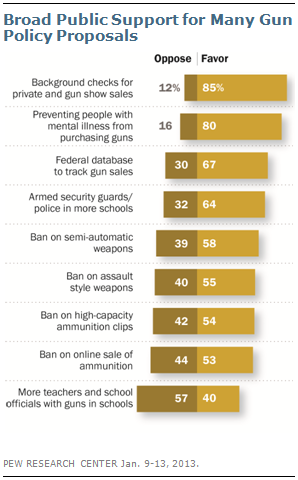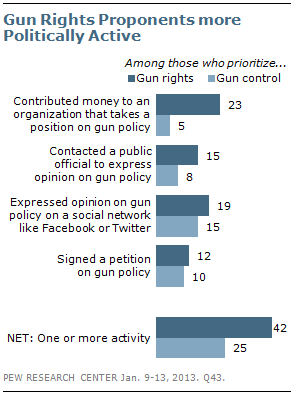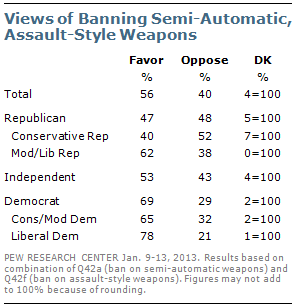Overview
While the issue of gun control remains divisive, there are clear areas of agreement when it comes to a number of gun policy proposals. Fully 85% of Americans favor making private gun  sales and sales at gun shows subject to background checks, with comparable support from Republicans, Democrats and independents. Similarly, 80% support laws to prevent mentally ill people from purchasing guns, with broad support across party lines.
sales and sales at gun shows subject to background checks, with comparable support from Republicans, Democrats and independents. Similarly, 80% support laws to prevent mentally ill people from purchasing guns, with broad support across party lines.
Related
In Social Media and Opinion Pages, Newtown Sparks Calls for Gun Reform
Views on Gun Laws Unchanged After Aurora Shooting
More Support for Gun Rights, Gay Marriage than in 2008 or 2004
But this bipartisan consensus breaks down when it comes to other proposals. Two-thirds of Americans (67%) favor creating a federal database to track gun sales, but there is a wide partisan divide between Democrats (84%) and Republicans (49%). A smaller majority of the public (55%) favors a ban on assault-style weapons; Democrats (69%) also are far more likely than Republicans (44%) to support this. Similar partisan divides exist when it comes to banning high-capacity ammunition clips or the sale of ammunition online.
The latest national survey by the Pew Research Center for the People & the Press, conducted Jan. 9-13 among 1,502 adults also tested two specific school-safety proposals, with widely different results. By a two-to-one margin (64%-32%), most favor putting armed security guards and police in more schools. But when it comes to more teachers and school officials having guns, most are opposed (40% favor vs. 57% oppose). The latter option is particularly divisive across party lines: 56% of Republicans would like to see more teachers and school officials armed, compared with just 23% of Democrats.
The Activism Gap
 The survey finds that 51% of Americans say it is more important to control gun ownership, while 45% say it is more important to protect gun rights. This balance of opinion is virtually unchanged from mid-December when, in the immediate wake of the Newtown, CT shooting, public opinion shifted modestly in the direction of gun control. These are the only surveys since Obama became president in which significantly more have prioritized gun control than gun rights.
The survey finds that 51% of Americans say it is more important to control gun ownership, while 45% say it is more important to protect gun rights. This balance of opinion is virtually unchanged from mid-December when, in the immediate wake of the Newtown, CT shooting, public opinion shifted modestly in the direction of gun control. These are the only surveys since Obama became president in which significantly more have prioritized gun control than gun rights.
There is a wide gap between those who prioritize gun rights and gun control when it comes to political involvement. Nearly a quarter  (23%) of those who say gun rights should be the priority have contributed money to an organization that takes a position on gun policy, compared with just 5% of those who prioritize gun control. People who favor gun rights are also about twice as likely as gun control supporters to have contacted a public official about gun policy (15% vs. 8%).
(23%) of those who say gun rights should be the priority have contributed money to an organization that takes a position on gun policy, compared with just 5% of those who prioritize gun control. People who favor gun rights are also about twice as likely as gun control supporters to have contacted a public official about gun policy (15% vs. 8%).
By contrast, comparable percentages of gun rights supporters (19%) and those who prioritize gun control (15%) say they have expressed their opinion about gun policy on social networks. And about one-in-ten in each group says they have signed a petition on gun policy (12% of gun rights supporters, 10% of gun control supporters).
Partisan Differences over Gun Policy
 Among nine policy options included in the survey, the largest partisan gap is over creating a federal database to track gun sales. Fully 84% of Democrats favor the creation of a federal gun sale database, compared with 68% of independents and 49% of Republicans.
Among nine policy options included in the survey, the largest partisan gap is over creating a federal database to track gun sales. Fully 84% of Democrats favor the creation of a federal gun sale database, compared with 68% of independents and 49% of Republicans.
The differences are nearly as great over more teachers and school officials having guns in schools: 56% of Republicans, 42% of independents and just 23% of Democrats favor arming more teachers and school officials.
 There also are substantial partisan gaps over banning assault-style and semi-automatic weapons (25 points and 19 points respectively), and banning the online sale of ammunition and high capacity ammunition clips (20 points, 18 points).
There also are substantial partisan gaps over banning assault-style and semi-automatic weapons (25 points and 19 points respectively), and banning the online sale of ammunition and high capacity ammunition clips (20 points, 18 points).
However, two proposals draw overwhelming support from Republicans, Democrats and independents — making private gun sales and sales at gun shows subject to background checks, and laws to prevent people with mental illness from purchasing guns.
Majorities in each political group also favor putting armed security guards or police in more schools, though this proposal garners more support from Republicans (73% favor) than from Democrats (62%) or independents (59%).
There are intra-party differences, as well as differences between parties, over several of these proposals. This is reflected in opinions about proposals to ban semi-automatic or assault-style weapons.
Opinions about both proposals are similar across party lines: 49% of Republicans favor a ban on semi-automatic weapons, while 44% favor banning assault-style. Among Democrats, 68% favor banning semi-automatic weapons and 69% support banning assault-style weapons.
Combining results from the two questions, 62% of moderate and liberal Republicans favor banning semi-automatic or assault-style weapons compared with 40% of conservative Republicans. While 78% of liberal Democrats (78%) favor banning semi-automatic or assault weapons, a smaller majority of conservative and moderate Democrats (65%) do so.
Gender, Education Differences over Gun Proposals
Men are divided over whether it is more important to protect the right of Americans to own guns or to control gun ownership (51% vs. 44%). Women, by contrast, prioritize controlling gun ownership: 57% view this as more important compared with 38% who prioritize gun rights.
 There also are sizable gender differences over some specific gun policy proposals: Fully two-thirds of women (67%) favor a ban on semi-automatic weapons, while men are divided – 48% favor such a ban while 50% are opposed.
There also are sizable gender differences over some specific gun policy proposals: Fully two-thirds of women (67%) favor a ban on semi-automatic weapons, while men are divided – 48% favor such a ban while 50% are opposed.
Majorities of women and men favor creating a federal database to track gun sales, but this proposal draws more support from women (73%) than men (61%). By contrast, men are more likely than women to favor more teachers and school officials having guns at school (47% vs. 32%).
Large majorities of men and women favor background checks for private gun sales and gun shows and laws to prevent mentally ill people from buying guns. There also is broad, though less overwhelming, support among both men and women for putting armed security guards or police in schools.
 There also are educational differences over gun policy proposals. A proposal to put armed security guards or police in more schools attracts widespread support among those with no more than a high school education (75% favor) and those with only some college experience (68% favor). Fewer than half of college graduates (44%) support this proposal.
There also are educational differences over gun policy proposals. A proposal to put armed security guards or police in more schools attracts widespread support among those with no more than a high school education (75% favor) and those with only some college experience (68% favor). Fewer than half of college graduates (44%) support this proposal.
College graduates are much more supportive than those with less education of banning high-capacity ammunition clips and assault-style weapons.
Gun Owners and Gun Policy
 A third (33%) of Americans say there are guns, rifles or pistols in their home, which is little changed from recent surveys. More than twice as many gun owners (65%) as those who do not own guns (30%) say it is more important to protect gun rights than to control gun ownership.
A third (33%) of Americans say there are guns, rifles or pistols in their home, which is little changed from recent surveys. More than twice as many gun owners (65%) as those who do not own guns (30%) say it is more important to protect gun rights than to control gun ownership.
However, majorities of gun owners favor a number of the gun policy proposals tested in this survey: Fully 90% favor laws to prevent mentally ill people from buying guns and 85% favor making private gun sales and sales at gun shows subject to background checks. By 60% to 37%, gun owners also favor the creation of a federal government database to track all gun sales.
 The Political Landscape
The Political Landscape
As has been the case over the past decade, neither party has a clear political advantage when it comes to the gun control issue: 38% feel the Republican Party does a better job of reflecting their views, while 40% say the Democratic Party. Not surprisingly, gun owners and those who prioritize gun rights see the GOP as more in line with their thinking, while non-gun owners and those who favor gun control say the Democratic Party shares their views.
Vice President Joe Biden, who is leading the White House effort to  formulate new proposals to reduce gun violence, gets mixed ratings from the public: 42% have a favorable impression of him, 42% unfavorable. This is virtually unchanged since late October on the eve of the election (44% favorable, 42% unfavorable).
formulate new proposals to reduce gun violence, gets mixed ratings from the public: 42% have a favorable impression of him, 42% unfavorable. This is virtually unchanged since late October on the eve of the election (44% favorable, 42% unfavorable).
Views of Biden are deeply divided along partisan lines – 77% of Republicans have an unfavorable opinion of him, while 75% of Democrats have a favorable opinion. Biden is viewed unfavorably by 63% of people who say the priority should be protecting the rights of gun owners, and favorably by 60% of those who prioritize controlling gun ownership.


